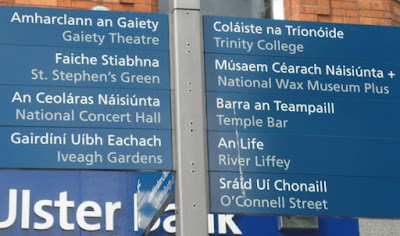Opinion piece by Kristin Hall in The Spinoff
 |
| pn186 |
But how do you re-invigorate a language? How do you convince a generation of youths that the ancient idiom of their country is just as important as being able to communicate in a sequence of tiny pictures of eggplants?
In Ireland, more than a million people (1,761,420 people in fact) already claim to speak Irish. Of those, around 74,000 speak Irish daily.
Compared with New Zealand statistics, the latest available census (carried out in 2003) suggests there were approximately 125,000 speakers of te reo Māori at that time. Of those, it’s believed there are 50,000 Māori adults who can speak Māori well or very well.
Compared with New Zealand statistics, the latest available census (carried out in 2003) suggests there were approximately 125,000 speakers of te reo Māori at that time. Of those, it’s believed there are 50,000 Māori adults who can speak Māori well or very well.
Proficient or not, you’ve got to admit there’s a yawning gap between speakers of Irish and speakers of Māori. You might think that a ridiculous comparison, but these two languages, often the subject of patronising ‘dying language’-themed diatribes by various non-experts have a bit more in common than you might think.
Ireland’s population is currently sitting at 4.8 million, a leprechaun’s hair ahead of New Zealand at 4.75 million. Both countries have native languages that were near-destroyed by colonisation, but are both currently experiencing a bit of a renaissance in their home countries.
So why is it that in Ireland you can turn on the radio and hear bits of Irish spoken on every station, even the ones that play DJ Khaled? Why is it that there are more people learning Irish on Duolingo alone than there are native Irish speakers?
The answer is: school.
Learning Irish is compulsory for all Irish students (with a few small exceptions) from the start of primary school at age six right through to the end of high school. Read more
Related articles
1) My suggestion on major and minor courses at school which would allow some space for
many skills not presently part of the NZ curricula (pn 79),
2) Compulsory conversational multi-lingualism is built into the Fiji constitution (pn184).
No comments:
Post a Comment